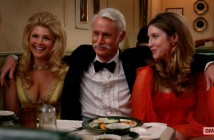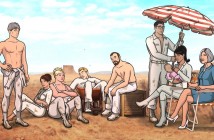March 30, 2015, 10:00 p.m. (EST), AMC
We get two very different stories in the penultimate episode of season one of Better Call Saul, that amount to two different ways of looking at the world and what it means to live in it. On the one hand, there’s Chuck’s caustic assessment of Jimmy: “People don’t change!” On the other, we have Mike’s even-keeled speech to the proto-Walter White who gives him his first job in Albuquerque: “It’s your choice.” At first blush, these two ideas are completely at odds. But in reality, they aren’t. It is your choice whether you’ll be a criminal or not. It is your choice whether to be a good person or a bad person. But changing what you are, inherently, is very hard work. You can’t wake up one day and put Slippin’ Jimmy behind you. You can’t decide all of your worst habits and deepest flaws just aren’t a part of you any more. No, change is hard, and most people ultimately aren’t up for it. But you can change. You just have to want it bad enough, and be willing to deal with the consequences.
That Chuck and Jimmy have different perspectives on this is not surprising. We know enough of Jimmy’s backstory at this point to understand why he might be disinclined to trust his con-man brother could turn into a very good lawyer, especially considering how dearly he holds the moral impact of the law. But we have also watched how hard Jimmy has worked to be good, to make himself a better lawyer, a better person, someone worthy of Chuck’s respect. Jimmy has tried to be the good guy, the guy who fights for the disadvantaged, the guy who puts in the time to make sure his clients are well served. But he won’t convince Chuck he isn’t just a con artist. And we’ve seen enough this season to know that Chuck’s doubts are well founded. Jimmy does take the easy way out. He is willing to cut corners if he can. He dreams big, and works hard, but those two rarely seem to connect fully. Is it because he isn’t dedicated enough to the cause? Or is it because forces, his brother included, are working to keep him out of the upper crust? Is Jimmy not working hard enough, or is he so caught up in his sense of how things should be, he’s trying to take the stairs five steps at a time, and stumbling on the way? Has Jimmy changed, or has he just gotten better at conning people?
As the episode ends and the truth comes out, Jimmy’s deepest pain isn’t that he’s been shut out of HHM, a place he doesn’t even want to work. No, the real hurt comes from learning it was his own brother that did it to him, that Howard was just playing the bad guy to keep Jimmy out, and that Kim tried to talk Jimmy into taking the deal just to keep him from learning the truth. Kim’s odd loyalty to Hamlin tips Jimmy off, and the dead cell phone connects the dots. Jimmy is smart enough for this job, its just that no one will really let him show off his skills. No one worth their salt will give him a chance.
Meanwhile, Mike is confronted with a meek, terrified amateur criminal and a couple of under-prepared thugs, and he matter-of-factly puts all of them in their place, proving himself essential enough to be three people, and then calmly explaining the moral ramifications of what has happened to the quiet, fearful man who hired him. When “Pryce” claims he is not a “bad guy,” Mike lays out his ethical views succinctly (in a speech so great, I tried to transcribe it in full below). Where you fall on the spectrum between cop and criminal doesn’t matter. What matters is how you comport yourself once you’re there. What matters is who you are, how you treat people, and whether you take seriously the code you live by. Whether you live by a code at all, or by whatever is convenient to you, whatever you can use to rationalize your behavior.
It’s dangerous to pre-judge someone. It’s almost always foolish to assume you know who someone is, and what they are capable of. Chuck has pre-judged Jimmy, and ultimately perhaps he has misjudged him. If you were to judge the three thugs in that parking garage, the old man with the Pimento sandwich might be the last one you would assume capable of taking out the other two and properly handling that confrontation on his own. That’s ultimately what “Pimento” is all about: you cannot correctly assess someone based on what common assessments tell you. People are too complicated for that. No one is as reducible as we might like, no personality or habit trapped in amber. Ultimately, it’s Jimmy’s choice who he wants to be. He can take the hard road, be a good lawyer, play by the rules, and do the right thing. Or he can take short cuts, and begin to understand what he is best at. He can flee from what is hard, and figure out how to make his life out of tiny steps in the directions of his dreams. He can lower his expectations and exceed those with aplomb. It’s his choice. He can change. Will he?
The Roundup
- “Confidence is good. Facts on your side? Better. Know what you’re walking into.”
- “I will burn the whole thing to the ground before I give it to you.”
- “The lesson is, if you’re going to be a criminal, do your homework.” “Wait, I’m not a bad guy.” “I didn’t say you were a bad guy. I said you were a criminal.” “What’s the difference?” “I’ve known good criminals and bad cops. Bad priests, honorable thieves. You can be on one side of the law or the other. But if you make a deal with somebody, you keep your word.”
- “You’re not a real lawyer. University of American Samoa, for Christ’s sake? An online course? What a joke. I worked my ass off to get where I am. And you take these short cuts and you think suddenly you’re my peer? You do what I do, because you’re funny and you can make people laugh? I committed my life to this. You don’t slide into it like a cheap pair of slippers and then reap all the rewards.”
- “You’re Slippin’ Jimmy. And Slippin’ Jimmy I can handle just fine. But Slippin’ Jimmy with a law degree is like a chimp with a machine gun.”
We get two very different stories in the penultimate episode of season one of Better Call Saul, that amount to two different ways of looking at the world and what it means to live in it.
-
GREAT




